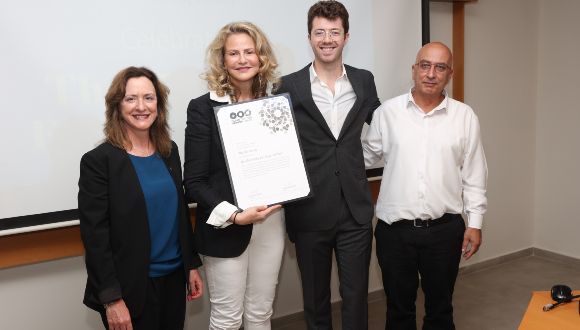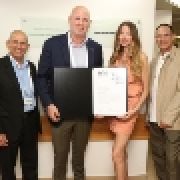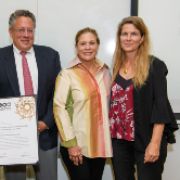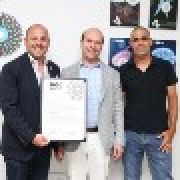BOG 2023: Envisioning Better Vision
Tel Aviv University held an informative event to celebrate the Elia Family Eye Research Fund’s third year and to provide an update on the breakthroughs it is supporting. The Fund drives research on retinal neurodegenerative diseases, which affect the sight and lives of hundreds of millions of people worldwide. The interdisciplinary research is run as a joint effort between the Sheba Retinal Research Laboratory and the BLAVATNIK CENTER for Drug Discovery. The Center works with academic institutions, pharmaceutical companies, and clinicians to bridge the gap between basic research and clinical translation for new and innovative drug treatments.
Ms. Vanessa Elia, a board member of American Friends of TAU and benefactor, expressed appreciation and amazement for the advancements which are being made to help those with these diseases, and shared the personal nature of her contribution. “I had the opportunity to spend the day with the scientists working on treatments, and it was truly incredible to see the advancements they’ve made in just three years. I live with this disease on a daily basis: my father has macular degeneration, and it is extremely challenging. My family is proud and humbled to be part of this team that is doing such amazing work.” Ms. Elia also drove home the importance of family in addressing her son Sasha, saying how glad she was that he was able to join her for the ceremony and the BOG.
Three Years of Progress
Prof. Ygal Rotenstriech and Dr. Ifat Sher, both of the Sheba Medical Center and the TAU Faculty of Medicine, shared some of the exciting strides that have been made thanks to the support of the Elia Family.
Some steps toward treatment:
(a) Development of a biologically active synthetic formulation of 9-cis-beta carotene, a biological pigment which helps prevent macular degeneration. Lab studies have demonstrated that this molecule can rescue dying photoreceptors and reduce inflammation in the retina.
(b) A drug screening campaign which resulted in the identification of several promising drugs that may be repurposed for the treatment of Retinitis Pigmentosa, a genetic retinal disease for which there is currently no cure.
(c) Personalizing treatment by growing a “retina in a dish” derived from patients’ own cells. These may be used to find the cause of the disease, and to test the safety and efficacy of treatments including drugs identified in the screening, drugs targeting specific patient mutations, novel RNA-based treatments and applicability of the gene-editing technology CRISPR.
Prof. Rotenstriech and Dr. Sher expressed optimism that the studies would soon be translated into clinically testable treatments for patients with retinitis pigmentosa, and then possibly applied to more common retinal degeneration diseases including Age Related Macular Degeneration.
Said Dean of Medicine Prof. Karen Avraham, “we know that all the basic research we’re doing here on campus is the most meaningful when we can translate it to clinicians and hospitals. This crosstalk, which the Blavatnik Center for Drug Discovery facilitates, is absolutely essential so that we can actually deliver cures and treatments. The generosity of this Fund and the Elia family is helping to make that possible.”





